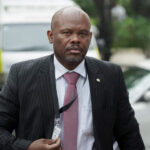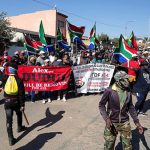GOMA, DRC – A humanitarian and political crisis is brewing in the Democratic Republic of Congo (DRC) as the planned repatriation of 189 wounded and sick South African National Defence Force (SANDF) soldiers has been abruptly and inexplicably cancelled.
The soldiers, deployed as part of the Southern African Development Community (SADC) mission in the DRC (SamiDRC), find themselves stranded in a war-torn region, their morale shattered, and their physical and mental health rapidly deteriorating.
The soldiers' injuries were sustained during intense and bloody confrontations with the M23 rebels, a notorious armed group that has wreaked havoc in eastern DRC for years. The battles, particularly concentrated around the strategic towns of Sake and Goma, have been fierce and unrelenting, resulting in significant casualties. In addition to the 189 wounded, at least 14 South African soldiers have tragically lost their lives in the conflict, a stark reminder of the dangers faced by peacekeeping forces in the region.
The initial plan for evacuation appeared to be well-coordinated, with the soldiers informed on Friday morning to pack their belongings in anticipation of a Saturday departure. However, that evening, the rug was pulled out from under them as they received the devastating news that the repatriation mission had been aborted. The reasons for the cancellation remain shrouded in mystery, fueling speculation and distrust among the troops.
The logistical arrangements involved a multi-stage journey, with the wounded soldiers first being transported to Kigali, Rwanda, before being flown to the Waterkloof Air Force Base in South Africa. An air ambulance, contracted from a private service provider, was on standby in Kigali to airlift the five most critically injured soldiers.
The remaining soldiers were to be transported aboard an aircraft provided by the Botswana Air Force, highlighting the regional cooperation involved in the mission. The repatriation plan also included wounded soldiers from Tanzania and Malawi, who, along with South Africa, contribute troops to the SamiDRC force, underscoring the shared commitment to peacekeeping efforts in the DRC.
However, in a cruel twist of fate, last-minute complications arose concerning landing rights for the aircraft, leading to the abrupt cancellation of the entire operation. The specific details of these complications remain unclear, but it is believed that bureaucratic hurdles and disagreements between various parties involved played a significant role.
The cancellation of the repatriation mission has sparked outrage and concern among medical professionals in both the DRC and South Africa. Doctors have warned that some of the wounded soldiers are in critical condition and require advanced medical care that is simply not available in the overstretched and under-resourced hospitals in Goma. The delay in treatment not only jeopardises the soldiers' physical health but also raises serious ethical and legal concerns.
Withholding necessary medical care from wounded soldiers is a clear violation of the Geneva Convention, which stipulates that even prisoners of war are entitled to medical treatment and humane treatment. The failure to provide adequate care to the stranded SANDF soldiers could have serious legal ramifications and further damage South Africa's reputation on the international stage.
Furthermore, the revelation that two of the female soldiers are reportedly pregnant has ignited a firestorm of controversy and speculation. While the circumstances surrounding these pregnancies remain unclear, the allegations of "juicy tlof tlof" have sparked outrage among some segments of the South African public, who view the soldiers' alleged behaviour as unprofessional and disrespectful to the SANDF.
The SANDF has yet to officially comment on the pregnancy allegations, but it is likely that an investigation will be launched to determine the facts and take appropriate action. The incident has also raised questions about the SANDF's policies regarding sexual conduct and relationships among deployed soldiers.
Many other soldiers are suffering from shrapnel wounds, which pose a significant risk of infection. The poor hygiene conditions in the Sake camp, coupled with limited access to clean water and sanitation facilities, have further exacerbated the risk of infection and disease. Several soldiers are reportedly struggling with chronic diarrhoea, a symptom of unsanitary living conditions and contaminated food and water.
Beyond the physical injuries, the stranded soldiers are also suffering from severe psychological trauma. The experience of being involved in intense combat, witnessing the deaths of comrades, and living in constant fear of attack has taken a heavy toll on their mental health. Many of the young soldiers deployed in SamiDRC have never experienced foreign operations before, making them particularly vulnerable to the psychological effects of war.
There is an urgent need for trauma counselling and mental health support for the stranded soldiers. However, access to mental health services in the Sake camp is limited, and many soldiers are struggling to cope with the emotional scars of war.
One distraught female soldier, speaking on condition of anonymity, expressed her despair and hopelessness, stating that she would have preferred a mercy killing, believing that she would inevitably be killed by the rebels. Her words paint a chilling picture of the fear and desperation gripping the stranded soldiers.
Another soldier, whose unit remains stuck at Goma airport, conveyed a desperate message to the South African public: "Tell the people and our families at home exactly what we are subjected to. Tell them the truth without all the lies about our circumstances. We are suffering as food and water are withheld from us as part of M23's power play. It is time for our government to realise that we are the pawns in the diplomats' diplomatic delays. We will not forget this."
Leaked letters circulating on social media reveal the extent to which South African officers are forced to negotiate even the most basic necessities, such as weekly rations and water, in writing with Colonel Augustine, the M23's military liaison officer. The letters paint a picture of humiliation and desperation, as the South African officers are forced to beg for supplies from the very rebels they are supposed to be fighting.
One particularly humiliating letter contains an apology to Colonel Augustine after a UN driver allegedly behaved inappropriately and nearly injured M23 rebels at the airport while delivering food to SamiDRC's rapid reaction unit. The South African officer assured Colonel Augustine that the driver had been instructed to obey M23 commands, a clear indication of the power and control that the rebels wield in the area.
The cancellation of the repatriation mission and the dire conditions faced by the stranded SANDF soldiers have sparked outrage and condemnation from opposition parties and civil society organisations in South Africa. Critics have accused the government of incompetence and negligence, arguing that it has failed to adequately protect its soldiers and ensure their well-being.
The government has yet to provide a clear explanation for the cancellation of the repatriation mission, fueling speculation that political considerations and diplomatic sensitivities may be at play. Some analysts suggest that the government may be reluctant to publicly acknowledge the extent of the challenges faced by the SamiDRC mission in the DRC, fearing that it could undermine South Africa's regional influence and credibility.
At the time of publication, the SADC had not responded to requests for comment, further fueling the perception that the regional body is either unwilling or unable to address the crisis. The silence from the SADC has been interpreted by some as a sign of weakness and disunity, raising questions about the effectiveness of the regional organisation in promoting peace and security in the DRC.
The aborted repatriation mission has cast a spotlight on the dire conditions faced by South African soldiers in the DRC and raises serious questions about the effectiveness of the SADC mission and the safety and well-being of its troops. The incident has also exposed the complex political dynamics at play in the DRC and the challenges of peacekeeping in a volatile and conflict-ridden environment.

Follow Us on Twitter











